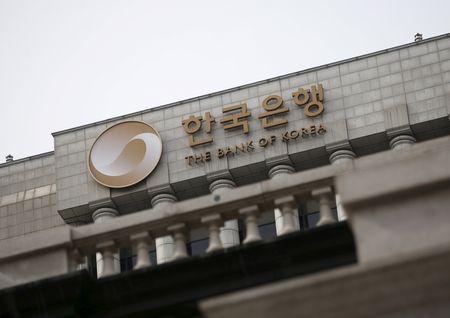By Cynthia Kim and Jihoon Lee
SEOUL (Reuters) -South Korea’s central bank kept interest rates unchanged on Thursday but revived expectations for an imminent policy easing that some economists see happening as soon as October as growth concerns overshadow inflation worries.
The Bank of Korea (BOK) held the benchmark interest rate at 3.50% in a unanimous decision, an outcome expected by 38 out of 40 economists surveyed by Reuters.
Governor Rhee Chang-yong, however, said four of the bank’s seven voting members were open to a rate cut within the next three months.
In its decision statement, the BOK said the bank now needs to “examine the proper timing of rate cuts while maintaining a restrictive monetary policy stance.”
With price pressures cooling and the recovery grinding to a halt in the second quarter, economists expect the BOK to step back from policy aimed at cooling demand.
That could mean cutting interest rates at its next policy meeting on Oct. 11, around the same time the U.S. Federal Reserve is widely expected to deliver its first rate cut in four years.
“Looking at inflation alone, we are heading towards the right conditions for interest rate cuts,” Rhee said in a news conference.
South Korea’s three-year treasury bond futures extended gains after Rhee’s news conference on expectations interest rates will now come down.
“It was neutral-to-dovish,” said Paik Yoon-min, an analyst at Kyobo Securities, who sees a cut in October.
“Markets were expecting about three board members would be open to a near-term rate cut but there were more. Rhee made it clear that inflation and economic conditions warrant a cut, to make financial stability concerns the main reason for a hold today.”
The BOK also downgraded forecasts for both growth and inflation this year.
It cut 2024 growth forecast to 2.4% from 2.5% previously, after Asia’s fourth-largest economy unexpectedly contracted in the second quarter. It now sees consumer inflation at 2.5% for this year, slower than 2.6% seen previously.
The prospects of an October cut come as the BOK’s global peers unwind the aggressive policy tightening of recent years with central banks in Canada, New Zealand and the euro zone having all loosened monetary settings.
While worries about slowing consumption are now replacing concerns about inflation, concerns about financial stability and household debt continue to shape policy deliberations in South Korea.
Rising apartment prices in Seoul took centre stage earlier this month with the government announcing plans to increase housing supply to cool surging prices.
“Board members made it clear that they are not going to excessively inject liquidity into the market that could spur real estate price increases,” Rhee said, adding that borrowing rules need to be further tightened to slow household debt increases.
(Reporting by Cynthia Kim, Jihoon Lee; Editing by Sam Holmes)





